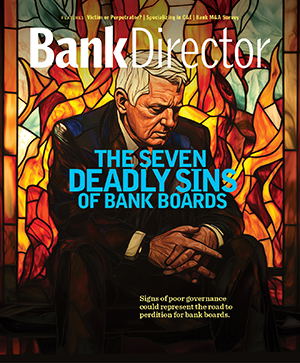
A Boardroom Conversation

Q: With higher stock valuations, the prospect for tax cuts and higher interest rates, do you think it’s a perfect time to be a bank right now?
JE: I think the banking business is good right now. A bank is really the economy that it serves. If the economy is doing well, banking generally does very well. We are not willing to make investment decisions predicated on the likelihood of a change in the tax rate, or change in interest rates or a change in regulation, because those are things that we have no control over and in general, will be positive. The issue is, how is the underlying business doing? I don’t see great excesses in the economy that cause me to worry about a bubble.
Q: What is driving your thought process for investing in bank stocks next year?
JE: We like to invest in companies that have a sound core [deposit] strategy. We have always believed that the value of the bank is a function of the right side of the balance sheet, that the bank has the ability to fund loans in a low cost and stable fashion. That allows banks to trade at valuations higher than traditional stand-alone finance lenders. While we have not deviated from that strategy in the past 10 years, the economic value of that strategy hasn’t been as apparent as it has been in times past, when rates have been higher and more volatile.
As we sit looking at the future, we believe that rates are going to move higher, which will cause the value of deposits to rise. I just don’t know when that will happen.
Q: So you’re not changing your strategy?
JE: The strategy is to find business-focused commercial banks with strong deposit franchises. Those banks tend to be asset sensitive. Their margins will expand if and when interest rates rise. If rates are not moving up, the focus needs to be on how to make that franchise more efficient, which even in a rising rate period is a good thing. It’s never a bad thing to be more efficient.
Q: You’re not seeing any movement in margins?
JE: Certainly, for the community banks as a group, net interest margins are starting to move up and our portfolio companies certainly [have] started to move up. That’s a function both of the fact that rates have moved up some, and banks have continued to increase the loan to deposit ratio. You’ve had a more favorable mix on the asset side.
Q: The people who predicted the disruption of banking by financial technology companies haven’t seen it yet. What do you think is most likely to be disrupted, especially about banking’s business model, if anything?
JE: I think fintech has been fantastic. It’s been the cutting edge of how the industry can be more efficient in delivering a standardized product. That’s always a good thing. The industry will be continually confronted with the need to be more efficient. If there are better mousetraps out there, it’s great for the industry. At the end of the day, the challenge will always be for those fintech companies to fund the loans that they’ve generated. Longer term, it’s more likely that those companies will be embedded inside a bank where you have a stable source of funding.
Q: You think the bigger banks will buy a lot of these fintech companies?
JE: Yes, or certainly enter into joint ventures with them. The largest banks in the country have deposits that are well in excess of the loans on their balance sheets. From their standpoint, this could be an opportunity to more effectively deploy the deposits that they have.
Q: Do you see any aspect of banking being disrupted?
JE: When I got in the business, the large money center banks were in the business of lending money [to] Fortune 500 companies. The Fortune 500 doesn’t borrow money anymore to any great degree from banks, and they have gone to the capital markets for that. The industry evolved. The industry has been able to evolve and change, and I don’t think it will be any different with fintech.
Q: What do you worry most about next year when it comes to banking?
JE: It’s cyber risk. If you’re not terrified about what could happen in cyber, you’re deluding yourself. To assume you would not be subject to an attack is to leave yourself underprepared.

Join OUr Community
Bank Director’s annual Bank Services Membership Program combines Bank Director’s extensive online library of director training materials, conferences, our quarterly publication, and access to FinXTech Connect.
Become a Member
Our commitment to those leaders who believe a strong board makes a strong bank never wavers.

